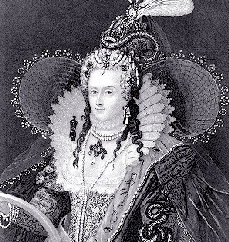


The Devaluation of the Divine Right: Power Sharing Shakespeare, writing only decades prior to the Gunpowder Plot in his play Macbeth,
demonstrates that despite the development of the monarchy from pre-historic times,
the mystical aura of the king, for which the people gave power, was
still important to the man in the street.
Shakespeare, writing only decades prior to the Gunpowder Plot in his play Macbeth,
demonstrates that despite the development of the monarchy from pre-historic times,
the mystical aura of the king, for which the people gave power, was
still important to the man in the street.
 This arrangement works well for the ruler of a small land and of
a unified cultural group content to remain within its bounds. However, it is
severely stressed as the Divine provider and warrior ruler goes beyond the
bounds of the group to the domination of or negotiation with other Divine
warriors, other groups and other territories to become a warlord of
a large state. The nobles assisted the king by providing power on the
ground which was supported by tradition in their estates and lands.
This arrangement works well for the ruler of a small land and of
a unified cultural group content to remain within its bounds. However, it is
severely stressed as the Divine provider and warrior ruler goes beyond the
bounds of the group to the domination of or negotiation with other Divine
warriors, other groups and other territories to become a warlord of
a large state. The nobles assisted the king by providing power on the
ground which was supported by tradition in their estates and lands.
 The efficient maintenance of control over culturally diverse groups
is not brought about by constant warfare. Even when the local rulers were
defeated, as in Ireland by Henry VIII, it was recognized that due to their
traditional mandates, it was best to have them swear allegiance and remain
in power. Control was most effectively maintained by the sharing of power,
by the ruler with other rulers. Perhaps the height of the development of
this form of power brokering came during the reign of Elizabeth I.
The efficient maintenance of control over culturally diverse groups
is not brought about by constant warfare. Even when the local rulers were
defeated, as in Ireland by Henry VIII, it was recognized that due to their
traditional mandates, it was best to have them swear allegiance and remain
in power. Control was most effectively maintained by the sharing of power,
by the ruler with other rulers. Perhaps the height of the development of
this form of power brokering came during the reign of Elizabeth I.
 In exchange for status and conspicuous power in the capital and proximity
to the divine ruler local rulers, generally heads of old families, both
Catholic and Protestant, assisted Elizabeth in the maintenance of control
over and efficient exploitation of subject regions. As part of the
arrangement the ruler lost a share of decision making power. This
strategy efficiently brought in and increased revenues and ensured the
continuation of the centralization of government, but it tended to weaken
rulers ability to command absolute power.
In exchange for status and conspicuous power in the capital and proximity
to the divine ruler local rulers, generally heads of old families, both
Catholic and Protestant, assisted Elizabeth in the maintenance of control
over and efficient exploitation of subject regions. As part of the
arrangement the ruler lost a share of decision making power. This
strategy efficiently brought in and increased revenues and ensured the
continuation of the centralization of government, but it tended to weaken
rulers ability to command absolute power.
 Hey? What have you done lately? Let us know! |
|
| |||||
|---|---|---|---|---|---|
| Home | Terrorism | Policy | Definitions | Divine Right | Elizabeth |
| Devaluation | Philosophy | Essex | Present | News | Feedback |